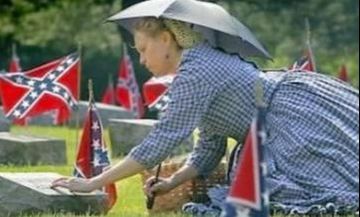The Confederate Flag, described by Rogers as “the most controversial symbol in American history,” flies without criticism or controversy. In fact, it appears almost everywhere and on almost everything—from belt buckles to bumper stickers. Children dress up in “Rebel” uniforms, Confederate graves are lovingly attended to by citizens, and the community gathers annually to celebrate their Confederate heritage.
Yes, that’s right, dear reader … Confederate heritage. 2016 marked the 150th anniversary of the arrival of the first Confederate settlers into this region. Ultimately about 30 families relocated to plant cotton or other agriculture commodities after the war. The lure of inexpensive, fertile land and the escape from the chaos inherent at the end of the war and the travails of Reconstruction proved to be more than enough motivation for theses former Confederates to strike out and start anew. This anniversary was to be commemorated with a celebration “in a peaceful patch of leafy greenery next to a small chapel and near a graveyard where settlers and their descendants—Confederados as they are known here—have been buried for generations.” More than 2,000 people were expected to attend, including (gasp!) Brazilians of colour: “Of course (black people) are welcomed,” Kareline Townsend Lucke, says through a translator. “Welcomed in the best way possible like everyone, without any distinction ….” In this alternative universe, Rogers astutely observed that there is no “negative association” with the flag that “many Americans see as a symbol of slavery and segregation.” In fact, Rogers—despite his best efforts, I’m sure—could find no evidence of “racism.” “Instead,” noted Rogers, “they are proud of their culture, and Confederate memories are regarded as an appreciation of lineage, not a historical blight.” The words of Marcelo Sans Dodson, president of the Fraternidade Descendência Americana, sum up the problem as follows: The problem (in America) is not with the flag. The problem is with the people’s mindset …. We are sad to see brothers and sisters in the U.S. fighting amongst each other and (not respecting) the right of one side to defend their heritage. That is the lesson that we here in Brazil have. They should overcome and reconcile and make peace with each other and respect the right of fellow Americans to look at the Confederate flag with love…. Different people have different meanings. A good society is one that will respect (them). In Brazil, Confederados do not suffer the ideological harassment and the political bullying that American “Confederados” do in the United States. Even this American journalist, despite his greatest efforts, begrudgingly acknowledged that there was nothing nefarious or hateful in the Confederados celebration of their history, heritage, and culture—including the “most controversial symbol in American history,” the Confederate flag—which is openly and proudly displayed as an emblem of their identity and a symbol of the love in the Brazilian city. While Brazilian Confederados provide a compelling counterexample to the shallow and uncharitable treatment of Southerners expressing genuine affection for their history, heritage, and culture, I would not expect a reversal in the prevailing sentiment in the press. Your Confederate Memorial Day observance or Living History event, dear reader, will not be covered with the same thoughtfulness and care. Brazilian Confederados can be taken at their word. American “Confederados” cannot. NOTE: The preceding was extracted from the author’s book Confederaphobia: An American Epidemic. The title was changed from “The Curious Case of the Confederado” to the title above for this post. [i] You can find Rogers’s article HERE.
0 Comments
Leave a Reply. |
AuthorPaul C Graham holds a Bachelor and Masters Degree in Philosophy from the University of South Carolina. He is past president of the SC Masonic Research Society and the current editor of The Palmetto Partisan, the official journal of the SC Division of the Sons of Confederate Veterans. Mr. Graham is a member of several organizations including The Society of Independent Southern Historians and The William Gilmore Simms Society. He is co-founder and managing editor of Shotwell Publishing, Archives |
Proudly powered by Weebly

